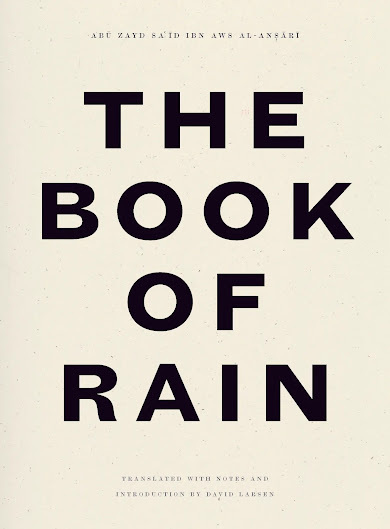Abū Zayd al-Anṣārī, The Book of Rain, translated by David Larsen
No rivers flow into theArabian Peninsula. Before desalinization technology, all its fresh wateroriginated from the sky. Great tracts of the peninsula were inhabitable only atrain-seasonal intervals, and have until modern times been the exclusiveterritory of pastoral-nomadic communities. That these communities would developan elaborate vocabulary for precipitation and groundwater is unsurprising, andyet (cautioned by the fallacy of “Eskimo Words for Snow”) I refrain from supposinga causal link. The proliferation of Arabic words for weather is proportionateto the proliferation of Arabic words for all kinds of things. (David Larsen, “INTRODUCTION”)
 Ifound myself taken with
The Book of Rain
, “the earliest known catalogue of Arabic weather-words, by earlyArabic linguist Abū Zayd al-Anṣārī,” as translated by New York-based scholar, poet and translator ofpre-modern Arabic literature, David Larsen (Seattle WA/New York NY: Wave Books, 2025) (although I would caution him that the people of theCanadian north, in my understanding, consider that particular moniker a colonialterm, and prefer to be referred to as the Inuit). The Book of Rain isnot only accompanied by an expansive critical introduction by the translator,but a book’s worth of footnotes at the end, adding layering and nuance to thestudy of such an intriguing text more than a thousand years old (the publisher’swebsite notes that the author died in “Basra circa 830 CE, at the age ofninety-five,” if you want to have a temporal sense of the original composition).If you want to know a people, a culture, there’s no better way, one might say,than to approach from the foundation oflanguage, and Larsen offers incredibly detailed insight into the context and reasonsfor differences both temporally and culturally far distant from most westernunderstandings. As Larsen writes in his introduction: “For Arabic langue worthyof study, there were two funds of evidence. One was historical precedent, asenshrined in proverbial expression, pre-Islamic poetry, the text of the Qur’ānand, to a lesser extent, Prophetic hadith. The other was contemporary Bedouinspeech. Certain tribes’ supposed immunity to linguistic corruption gave theirdialects a classical authority that was tantamount to the ancients.” Is this abook of notation or of language or of beautiful music? From the opening line of“[NAMES OF RAIN]”:
Ifound myself taken with
The Book of Rain
, “the earliest known catalogue of Arabic weather-words, by earlyArabic linguist Abū Zayd al-Anṣārī,” as translated by New York-based scholar, poet and translator ofpre-modern Arabic literature, David Larsen (Seattle WA/New York NY: Wave Books, 2025) (although I would caution him that the people of theCanadian north, in my understanding, consider that particular moniker a colonialterm, and prefer to be referred to as the Inuit). The Book of Rain isnot only accompanied by an expansive critical introduction by the translator,but a book’s worth of footnotes at the end, adding layering and nuance to thestudy of such an intriguing text more than a thousand years old (the publisher’swebsite notes that the author died in “Basra circa 830 CE, at the age ofninety-five,” if you want to have a temporal sense of the original composition).If you want to know a people, a culture, there’s no better way, one might say,than to approach from the foundation oflanguage, and Larsen offers incredibly detailed insight into the context and reasonsfor differences both temporally and culturally far distant from most westernunderstandings. As Larsen writes in his introduction: “For Arabic langue worthyof study, there were two funds of evidence. One was historical precedent, asenshrined in proverbial expression, pre-Islamic poetry, the text of the Qur’ānand, to a lesser extent, Prophetic hadith. The other was contemporary Bedouinspeech. Certain tribes’ supposed immunity to linguistic corruption gave theirdialects a classical authority that was tantamount to the ancients.” Is this abook of notation or of language or of beautiful music? From the opening line of“[NAMES OF RAIN]”:Firstof the names for rain is al-qiṭqiṭ“The Tiny Grain.” This is the finest of the rains.
How does a title such as this emerge with apoetry publisher? That is a curiosity, by itself, although there are obvious parallelsaround language and thinking, and critical thinking about language and subjectmatter in the context of its time and place, its landscape and culture. Larsen,further in his introduction, asks: “Does the Book of Rain count asnatural history, or is it a book of language only? The answer depends on yourexpectations of natural history as a literary genre. In early modern Europe,natural history’s emergence is identified with the purge of folkloric materialfrom inquiry into plant and animal life. A rededicationof language to nonlinguisticknowledge is how Michel Foucault characterized it, saying that natural history ‘existsas a task only in so far as things and language happen to be separate.’ This obviouslyexcludes the Book of Rain, whose sources are purely linguistic.” From thesection “NAMES OF WATERS,” as it begins:
Greator small, a river is called al-nahr and al-nahar; al-anhāris its plural. Al-jadāwil “canals,” sg. al-jadwal, are rivulets madeto split off from a river to irrigate crops and palm groves. Al-qanā “anaqueduct” is a canal made to flow underground, and is not called qanā,pl. aqnā (or, as some might say, qanat, pl. quniyy) unlessit has a covering. Any uncovered watercourse is a jadwal, and a khudad“channel” is similar to it. All three words are used whether they run dry orflow with water.
Al-kurr is a “holding pool” wherewater accumulates. (The rope that men loop around the trunk of a palm in orderto climb it is called al-karr.)
To describe water as la’īn “sordid”is to find fault with it. Al-‘udmul, pl. al-‘adāmil, is “well-aged”water, and anything else that is old. Water that does not cover the ankle isdescribed as ḍaḥl“shallow” and ḍaḥḍaḥ “superficial.” Al-raqāq “a thin layer” is used in a similar fashion. Al-barḍ is a “meager” amount of water that you manageto gather, and verb tabarraḍa means “to seek water.”



